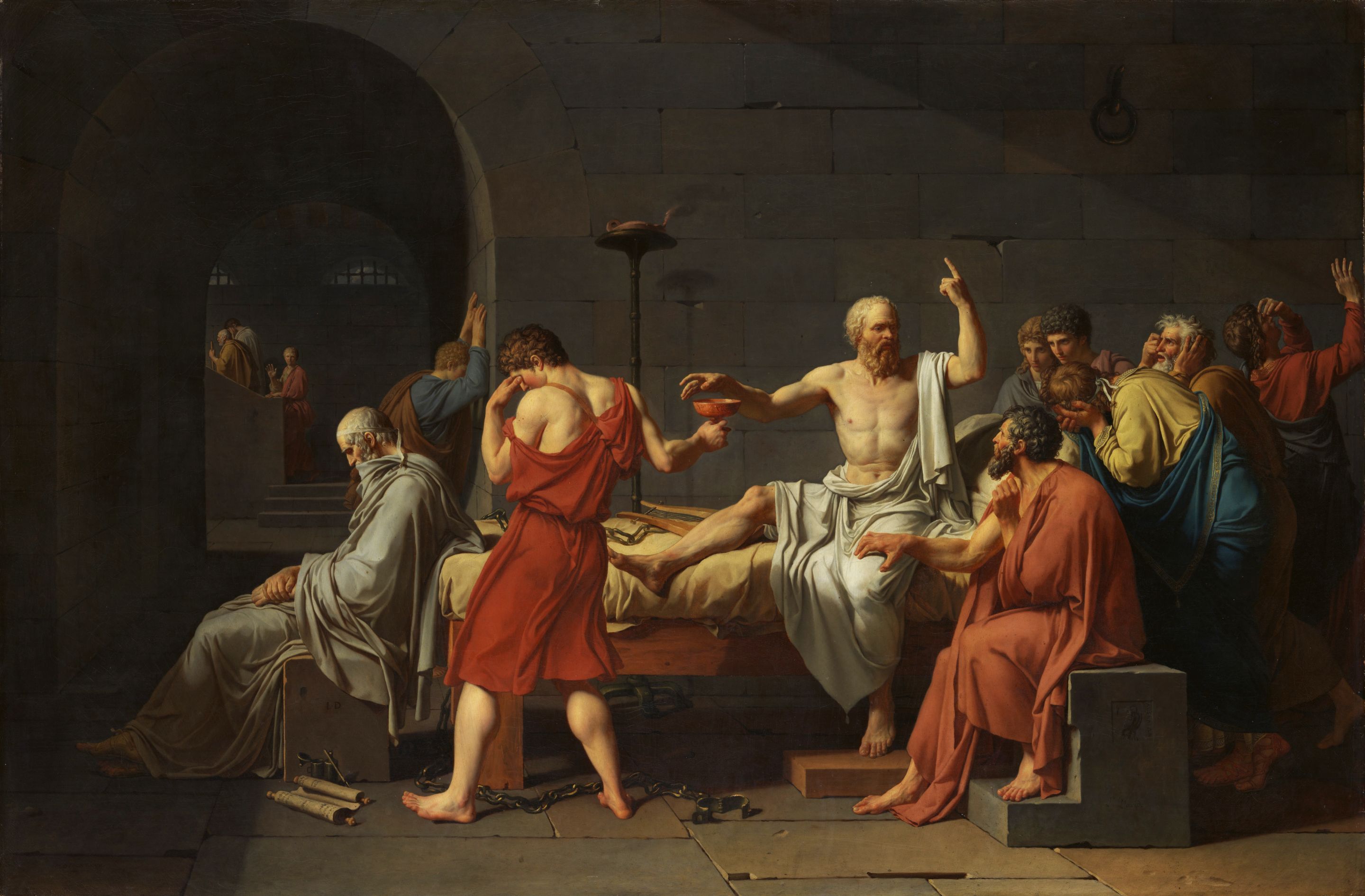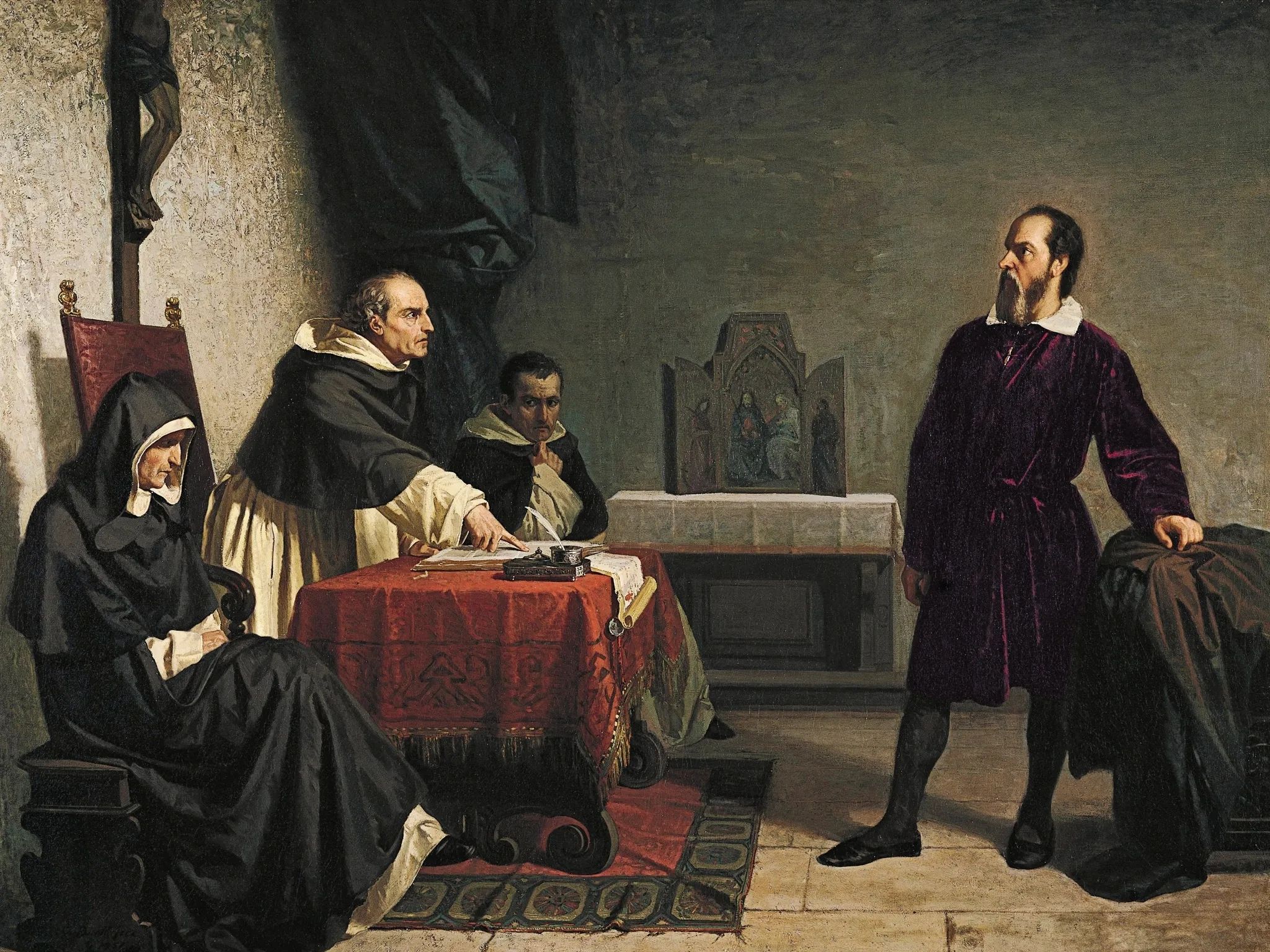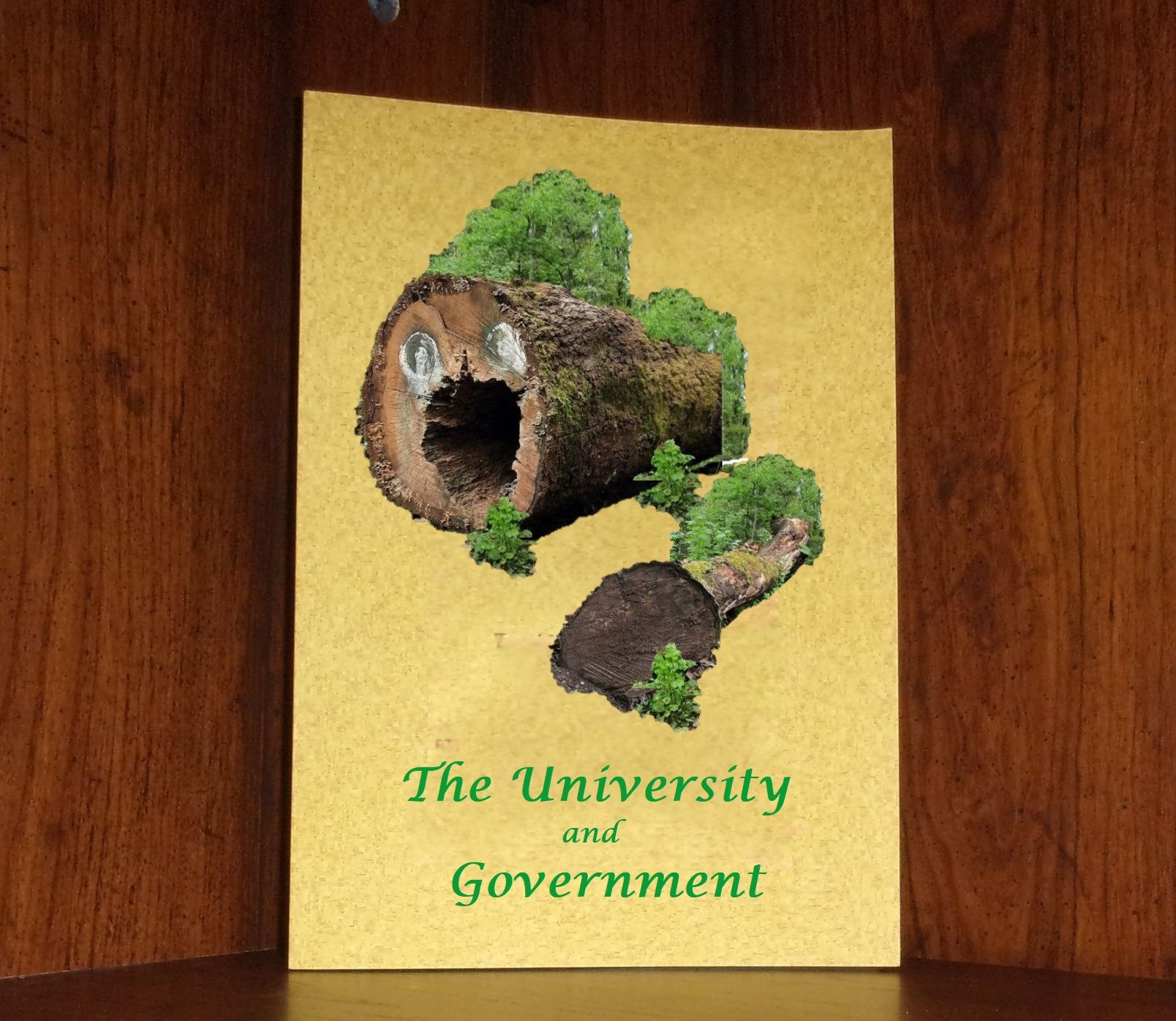Most of us have heard the expression, The pen is mightier than the sword. The intent of that quote is obviously that ideas are powerful. They can be like a virus. Once they take hold, they are hard to stamp out.
Socrates was
put on trial only because his ideas offended the authorities of the day. When he refused to recant he was sentenced to death, and famously drank a brew of hemlock.
Death of Socrates Jaques-louis David,1787. Metropolitan Museum of Art.
Jaques-louis David,1787. Metropolitan Museum of Art. 
Galileo was
tried by a Catholic Inquisition court because his ideas ran contrary to orthodoxy. He was found guilty of that offense and sentenced to house confinement for the rest of his life.
Galileo Facing the Inquisition Cristiano Banti. 1857.
Cristiano Banti. 1857. 
An idea can sweep across the world. It is said that although Napolean's armies were ultimately defeated, the
ideas those armies, carried with them, of revolution and the rights of man, spread across Europe.
Ideas are powerful, and the 'wrong' ideas, in the view of some governments, are dangerous. It is little wonder then, that when one looks at the histories of authoritarian regimes a common target for control is the university system.
Universities are where ideas incubate, and spread. As one reads about various transitions of power from democracy to autocracy, a monotonous refrain emerges. Along with loss of civil liberties, there is an almost an immediate move to emasculate universities.
As I prepared to write this blog I looked around the world and at different autocratic regimes in history. The move to take over universities is a consistent thread. Leaders seek to solidify control of a nation by controlling the minds of the young and the intelligentsia.
In the next few paragraphs I will give a few examples. As you read these examples, think about events in countries around the world. Reflect on the actions of those governments. Have there been efforts (by government) to neuter universities? Have there been efforts to de-fund universities? Have there been efforts to control who is allowed to attend universities, and who is allowed to lead universities? Have there been efforts to change courses of study offered at universities?
If the response to these questions is yes, think about what that answer signifies in the context of history. Keep in mind the oft-repeated quote (
attributed to Edmund Burke): "Those who don't know history are destined to repeat it."
I realize that each of the governments described in my blog as autocratic has, or had, supporters. In each case there are or were people who would argue for the merits of that leader, of that government.
Pinochet Military Coup, 1973, ChileAn
article published at the Development Economics Center at the University of Chicago, states, "...the dictatorial regime of Augusto Pinochet assumed control of all universities..." Public funding of universities, the article explains, was reduced and consequently the number of openings for incoming students was reduced. A whole generation was affected by the loss of educational opportunity.
An
article published by the World Bank states that the Pinochet government placed members of the military junta in leadership positions in universities. "...faculty and students suspicious of supporting the deposed left-wing government were routinely dismissed, but in some cases also arrested, tortured, or killed."
Parade for Pinochet on 10th Anniversary of His Coup User: Ben2 on Wikimedia commons. Used under
User: Ben2 on Wikimedia commons. Used under 
Francisco Franco, Spain, 1936 An article, by Rodríguez Tejada, of the University of Valencia (
Surveillance and Student Dissent), published by
Queens University, Canada explains how the Franco regime not only took over universities, but reconfigured them so they would ideologically support the policies of the government. "The harsh political purge that Spanish universities suffered just after the civil war of 1936-1939 guaranteed the eradication of all disaffection there. It enabled the Franco dictatorship to entrust the colleges with the mission of educating intellectually and politically the regime’s heirs."
Another
article by the Complutense University of Madrid, describes how professors and students were purged from the universities. A centralized university system was instituted with one rector ensuring uniformity of ideology and instruction.
Abdul Fattah al-Sisi Coup in Egypt, 2013A 2015
article published in
Foreign Policy magazine describes how Sisi, soon after assuming power, took control of universities in Egypt. The article states, "President Abdel Fattah al-Sisi issued a decree giving him the authority to personally appoint the presidents and deans of all public universities."
In 2015, a publication,
University World News explained that university leaders would no longer be elected by the universities. Instead the government would appoint leaders to top positions. The article goes on to state: " The decree also gives the head of state the right to sack any of the top university administrators before the end of their terms upon a recommendation from the Supreme Council of Universities, a state-appointed body in charge of higher education policies."
I know, Hitler is an easy target, but I can't resist. Here is a bit about Hitler and university control.
Adolf Hitler, Austria, 1938 (Anschluss)An
article published by Boku University in Austria explains how the university was affected after the Nazis came to power in 1938.
"The entire university was organized based on the Führer principle. This also implied the end of a free Rector election." The article describes the cases of individual lecturers who were sent to concentration camps (I don't know if this was because of ideology or religion). Also, "The National Socialist takeover at the BOKU was characterized by a loss of power of the professors ..." and "After the takeover, several professors were relieved of their positions."
**My Collage**
This week I used only one LIL resource for my collage. This happened to be a photo I contributed some time ago. The photo was of a book I wrote! A book that didn't sell a single copy, except to me.
I switched out the image on the front of the book. I inserted elements from this week's template photo, by
@quantumg.Below this paragraph is the actual template. It is a really suggestive picture. I wanted to do something fun with it but ended up with a serious blog. Maybe I'll do another fun collage.
I borrowed from Pixabay for some of the elements, which are credited here:
Ruined temple
Darkmoon_art
PixabayMy piece, I think obviously, represents the destruction of a university, and of learning.
LMACYears ago
@shaka had an inspiration. He thought it might be fun to invite people to make collages. I entered the third contest and have been associated with the community ever since. I don't enter the contest any more, because I'm on the jury that selects finalists. However, I do make collages. There is a kind of joy in letting go of my usual mode of expression, which is words, and to venture into another kind of thought. When I make a collage I use different parts of my brain from what I use when I write something.
Making a collage and writing something related to it is the best experience.
We invite everyone to enter this week's contest. Or, anyone can make a freestyle. Have fun. And, if you like photography, you can contribute to LIL. I get a kick out of seeing my contributed images pop up in the blogs of other people. Regulations and procedures for using this resource can be found on
@shaka's blog,
here.Thank you for reading my blog. I hope everyone has a most wonderful weekend.
Peace and health to all.





